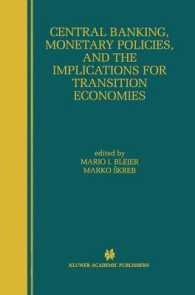Full Description
First comprehensive examination of the rise and decline of the Jewish communist movement in the English-speaking world.
While a number of books and articles have been written about Jewish Communist organizations and their supporters in particular countries, an academic treatment of the overall movement per se has yet to be published. A Vanished Ideology examines the politics of the Jewish Communist movement in Australia, Canada, Great Britain, South Africa, and the United States. Though officially part of the larger world Communist movement, it developed its own specific ideology, which was infused as much by Jewish sources as it was inspired by the Bolshevik revolution. The Yiddish language groups, especially, were interconnected through international movements such as the World Jewish Cultural Union. Jewish Communists were able to communicate, disseminate information, and debate issues such as Jewish nationality and statehood independently of other Communists, and Jewish Communism remained a significant force in Jewish life until the mid-1950s.
Contents
1. Introduction
Matthew Hoffman and Henry Srebrnik
2. "At What Cost Comrades"? Exploring the Jewishness of Yiddish-Speaking Communists in the United States
Matthew Hoffman
3. The Scorched Melting Pot: The Jewish People's Fraternal Order and the Making of American Jewish Communism, 1930-1950
Jennifer Young
4. Paul Novick, a Standard-Bearer of Yiddish Communism
Gennady Estraikh
5. Chasing an Illusion: The Canadian Jewish Communist Movement
Henry Srebrnik
6. The Canadian Jewish Left: Culture, Community, and the Soviet Union
Ester Reiter
7. Jews in the Communist Party of Great Britain: Perceptions of Ethnicity and Class
Stephen M. Cullen
8. Jewish Communism in Australia
Philip Mendes
9. Jews and Communism in South Africa
David Yoram Saks
10. Conclusion: The End of a Dream
Matthew Hoffman and Henry Srebrnik
Contributors
Index







